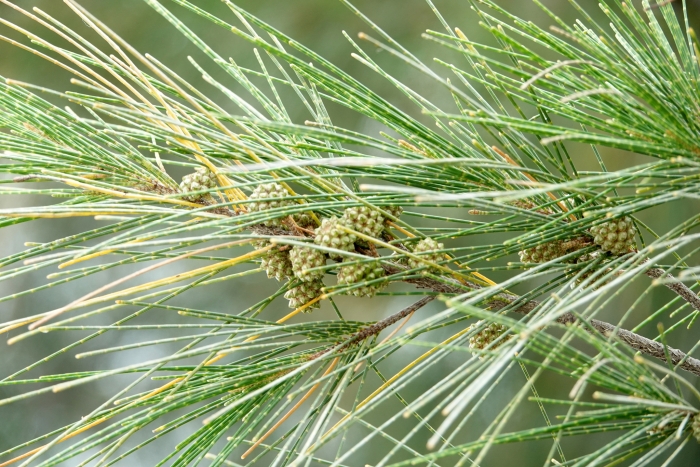River She-Oak
(Casuarina cunninghamiana)
River She-Oak (Casuarina cunninghamiana)
/
/

Claire Herzog
CC BY 4.0
Image By:
Claire Herzog
Recorded By:
Copyright:
CC BY 4.0
Copyright Notice:
Photo by: Claire Herzog | License Type: CC BY 4.0 | License URL: http://creativecommons.org/licenses/by/4.0/ | Rights Holder: Claire Herzog | Publisher: iNaturalist | Date Created: 2020-06-09T10:54:04-07:00 |











































































Estimated Native Range
Summary
Casuarina cunninghamiana, commonly known as River She-Oak, is an evergreen tree native to riparian zones, riverbanks, and floodplains of Eastern Australia. It can grow to a height of 10–35 m (33–115 ft) with a spread of about 10 meters (33 ft). The tree features a typically erect trunk with dense, rough bark and fine, needle-like foliage that can create a weeping effect. Male flowers are reddish-brown, while female flowers are red, though they are not particularly showy. The cones are small, nearly round to elongated, about 10 millimeters (0.39 in) across, and contain winged seeds. River She-Oak is frost tolerant down to around −8 °C (18 °F) and is valued for its ability to withstand windy conditions and its suitability for coastal areas.
River She-Oak is appreciated for its fast growth rate and ability to provide quick screening. It is often used as a windbreak or for erosion control due to its extensive root system. This species is also planted for its adaptability to a range of soil types, including those with poor fertility. It requires full sun to part shade and can tolerate a variety of water conditions, from medium to occasional flooding. While it is not known for a particular susceptibility to diseases, its aggressive root system can be problematic near pavements or buildings. Casuarina cunninghamiana is considered invasive in some regions outside its native range, such as Florida, and should be planted with caution.CC BY-SA 4.0
River She-Oak is appreciated for its fast growth rate and ability to provide quick screening. It is often used as a windbreak or for erosion control due to its extensive root system. This species is also planted for its adaptability to a range of soil types, including those with poor fertility. It requires full sun to part shade and can tolerate a variety of water conditions, from medium to occasional flooding. While it is not known for a particular susceptibility to diseases, its aggressive root system can be problematic near pavements or buildings. Casuarina cunninghamiana is considered invasive in some regions outside its native range, such as Florida, and should be planted with caution.CC BY-SA 4.0
Plant Description
- Plant Type: Tree
- Height: 30-70 feet
- Width: 10-30 feet
- Growth Rate: Rapid
- Flower Color: N/A
- Flowering Season: Spring
- Leaf Retention: Evergreen
Growth Requirements
- Sun: Full Sun, Part Shade
- Water: Medium
- Drainage: Slow, Medium, Fast
Common Uses
Bird Garden, Erosion Control, Low Maintenance
Natural Habitat
Native to riparian zones, riverbanks, and floodplains of Eastern Australia
Other Names
Common Names: River Oak, River Sheoak, Australian Beefwood, Creek Oak
Scientific Names: , Casuarina cunninghamiana,
GBIF Accepted Name: Casuarina cunninghamiana Miq.